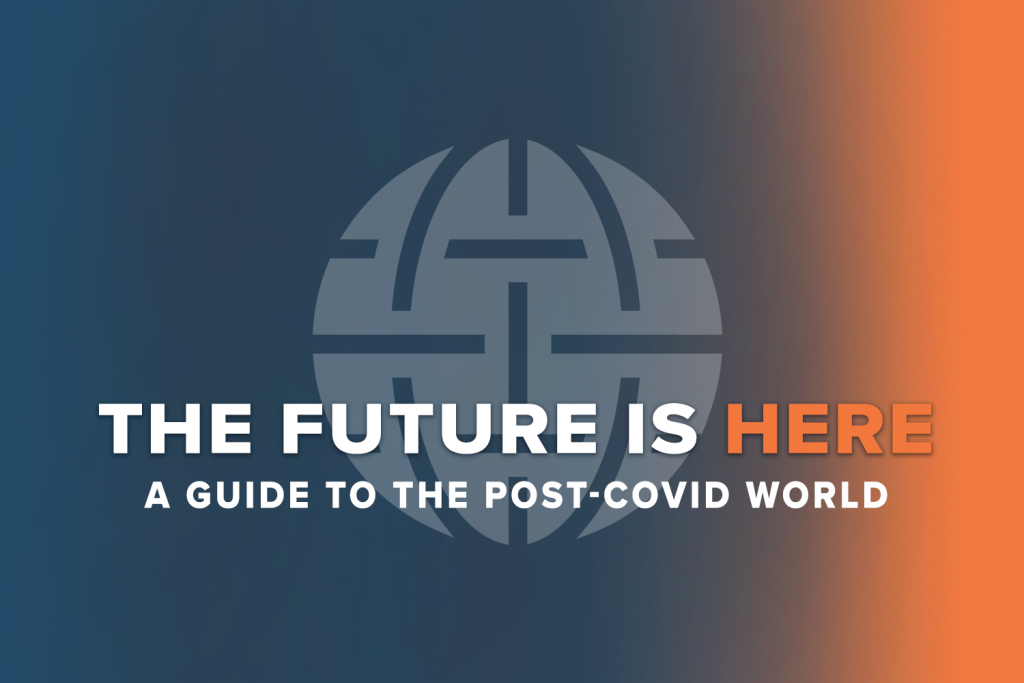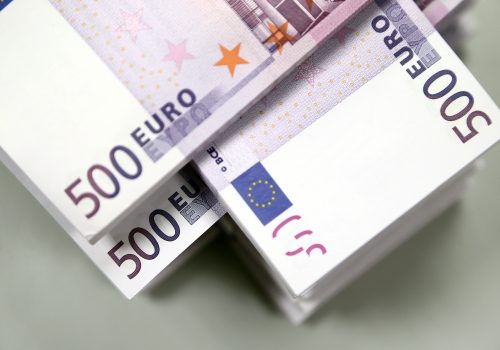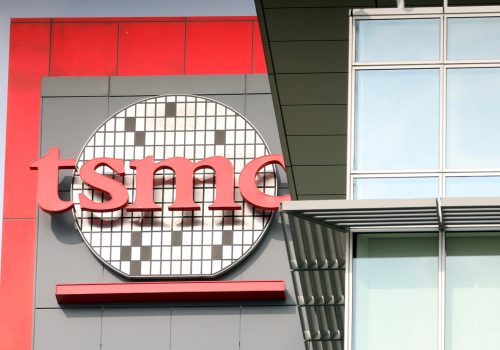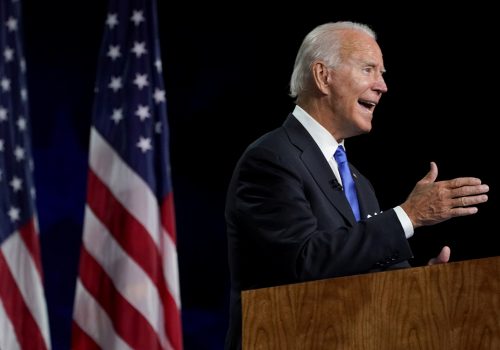The future is here: A guide to the post-COVID world 09/04/2020
Welcome to your new guide to where the world is headed during the pandemic era and beyond. Each week, we’ll bring you the latest and most significant expert insights and international news about how coronavirus is reshaping international affairs. To stay updated each week, sign up to the Coronavirus Alert here.
Let’s take a spin around the globe, in seven minutes or less.
In top stories this week:
- Invitations to the World Health Organization’s vaccine party have been sent out, but some invitees are still weighing their options.
- Economic policies to combat the effects of coronavirus in the United States and Europe are raising a new concern: zombie companies.
- After months of coronavirus restrictions, a passport gets a makeover and the pope reappears.
- But first…
The big story
This week’s key theme: International relations are getting more bubbly.
“Bubbles.” “Pods.” “Quaranteams.” Whatever you call them, many of us have begun to expand our in-real-life social circles from our households to our (carefully selected) friends, family, classmates, and coworkers. It’s no different for countries. Sure, just as the social networks we had pre-pandemic still exist, so too do all the traditional, formal alliances. But as countries, like people, cautiously venture back out into the world, they are also connecting on a more ad-hoc basis with neighbors and like-minded partners to construct novel travel zones or collaborate on economic-revitalization efforts.
Bubbles, though, have a tendency to burst. It’s still unclear which ones will prove fleeting and which will endure.
Pick your post-COVID buddies
During an Atlantic Council gathering of officials from leading democracies this summer, for example, the Canadian diplomat Martin Loken noted that new groups such as the D-10—the Group of Seven countries, Australia, South Korea, and the European Union—can help “build a stronger, more effective rules-based system to deal with the next pandemic” and other coming challenges. Just this past week, US Deputy Secretary of State Stephen Biegun said that weekly conference calls between him and his counterparts in India, Japan, Australia, South Korea, Vietnam, and New Zealand, to coordinate responses to the COVID crisis, presented a “natural grouping” for broader collaboration in the Indo-Pacific region.
And these new groupings aren’t just bubbling up at the national level. In a recent interview with the Atlantic Council’s Foresight, Strategy, and Risks initiative, where he is a nonresident senior fellow, Greg Lindsay wondered what other “new zones of influence” beyond those between states will emerge as a result of the pandemic.
“Networks of cities [are] forming and cooperating,” and powerful individuals and organizations are “offering policy advice and resources” to governments, noted Lindsay, the director of applied research at NewCities and a partner at FutureMap. Citing the Canadian government’s deal with Amazon to distribute medical equipment, he observes that “we are seeing national supply chains that are increasingly becoming orthogonal when it comes to nation states.”
The bottom line: In this more fluid era, the United States and its allies will have new opportunities to work together and increase their influence in the world. One major challenge, however, is that the United States is still struggling to contain the virus while many of its partners have for now made more progress in doing so.
Subscribe to The future is here: A guide to the post-COVID world
Sign up for a weekly roundup of top expert insights and international news about how coronavirus is reshaping international affairs.

The big picture
This week’s theme visualized: The pandemic’s path in the United States versus other D-10 countries.
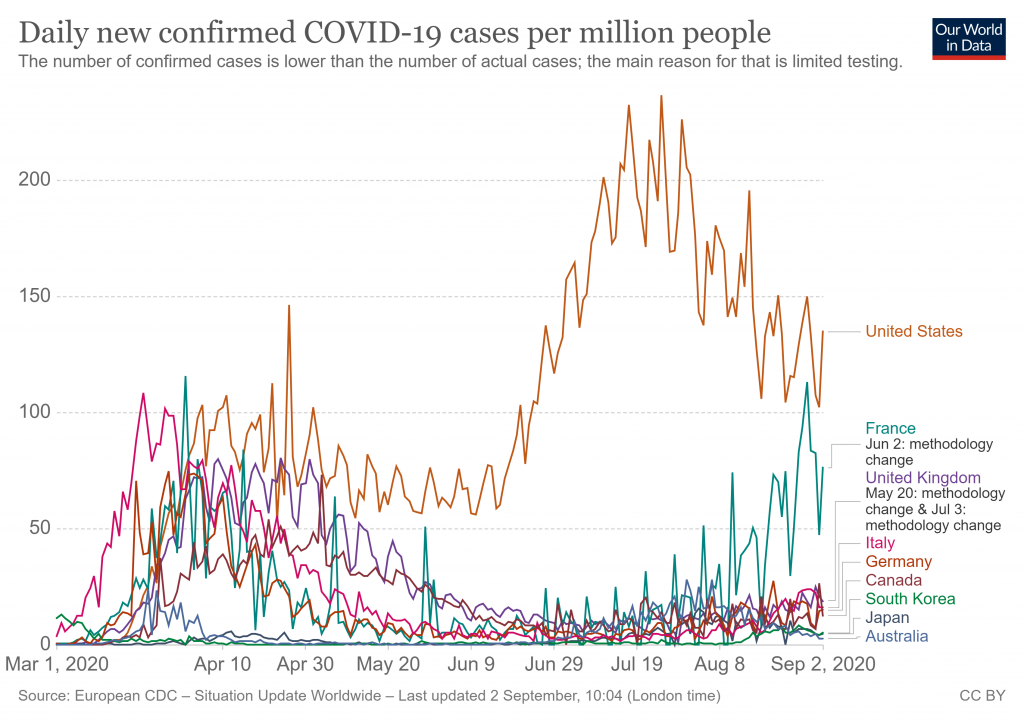
The world in brief
Insights from across the planet, in ten bullets or fewer
- Vaccine nationalism is disrupting plans to improve vaccine access. The World Health Organization (WHO) has had to revamp its global COVAX program, designed to ensure equitable access to a future vaccine, because of “vaccine nationalism,” as rich countries have been slow to join in and sought out bilateral deals instead, the Financial Times reported. The WHO extended the deadline for governments to sign up for COVAX by nearly three weeks to September 18.
- US out, EU in? China hinted it may participate in COVAX, while the United States has declined to take part in the program, Bloomberg said. The European Union (EU) has left open the possibility of member states buying potential vaccines through COVAX in what appears to be a change of policy, Reuters reported. Seventy-six wealthy countries—Japan, Germany, and Norway among them—are now committed to joining in, the newswire said.
- Vaccine by numbers: The European Union anticipates getting 30 million doses of AstraZeneca’s potential COVID-19 vaccine by the end of the year, which would cover 6 to 7 percent of the region’s citizens, Reuters said. And the initial doses that the WHO wants to secure for Africa will be enough to inoculate 20 percent of the continent’s residents, the newswire also reported.
- Tokyo Olympics can still happen without a vaccine. It’s about ten months until the opening ceremony of the Tokyo 2020 Olympics. Organizers say that even if Japan’s plan to vaccinate the entire country by the middle of next year doesn’t come off, the games can still go ahead—perhaps with limited spectators, The Washington Post reported.
- The pandemic has prompted Taiwan’s passport redesign. Taiwan, fed up with its nationals being confused as Chinese citizens and rejected from entering countries amid global coronavirus travel curbs, plans to revamp its passport by enlarging the island’s name, Reuters said.
- China is now bragging about its coronavirus response. “Beijing has tried to turn the coronavirus pandemic into a public relations opportunity,” Jessica Chen Weiss, a political scientist, and Ali Wyne, a foreign-policy analyst, wrote in The New York Times. “But Beijing’s bragging isn’t playing so well abroad.”
- Even a global business hub is yielding to the pandemic’s economic fallout. Singapore can’t sustain economic-stimulus measures forever to shield the city-state from the impact of coronavirus, Prime Minister Lee Hsien Loong told legislators, according to Bloomberg. The country must remain open to overseas talent even as it takes more steps to safeguard local jobs, he said in a two-hour speech.
- It’s green light, red light for travel around the world. China will restart direct international flights to Beijing from eight countries including Thailand, Greece, and Canada, CNBC reported. Poland took a different tack, banning direct services from more than forty countries—Spain, Israel, and Romania among them—as a result of coronavirus concerns, Reuters said.
- Economic recovery: a long haul ahead. “We have to deal with an economic situation where we will have a recovery, yes, but only step by step and not in all industries,” CNBC cited Christian Sewing, CEO of Deutsche Bank, as saying. The global economy will not return to pre-coronavirus levels for a “long time,” Sewing told a banking conference. Europe will have thousands of “zombie companies” and become less competitive if it keeps extending coronavirus-stimulus measures, Sewing also said, according to the Financial Times.
- An effort to restart the international film industry is underway. That, at least, is the goal of the 77th Venice Film Festival, which started on September 2 and is the first in-person festival since the pandemic began, according to The Hollywood Reporter. Also in Italy, Pope Francis resumed public audiences—an opportunity to restore the pontiff’s profile after months of coronavirus restrictions, The Wall Street Journal reported.
The inside scoop
Insights from the Atlantic Council
Collective wisdom
Observations from our community
We want to learn from you. What are you noticing in your area of expertise or corner of the world about where the post-COVID international system is headed?
Email editor@atlanticcouncil.org with your thoughts about how the coronavirus crisis is playing out in your world, and you may be featured in an upcoming edition.
